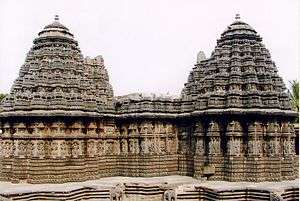Shikhara

Shikhara (IAST: Śikhara), a Sanskrit word translating literally to "mountain peak", refers to the rising tower in the Jain & Hindu temple architecture of North India.[1] Shikhara over the sanctum sanctorum where the presiding deity is enshrined is the most prominent and visible part of a Hindu temple of North India.[2][3]
In South India, the equivalent term for "shikhara" is "vimana".
These are not to be confused with the elaborate gateway-towers of south Indian temples, called "gopurams", which are perhaps the most prominent features of those temples.
Major styles
Among several styles of shikharas that can be seen in Hindu temple architecture, the three most common ones are:[2]
- the Dravidian style prevalent in southern India : The shikhara consists of progressively smaller storeys of pavilions.[4] The Dravidian style is highly ornate.
- the Nagara style prevalent almost everywhere else : The shikhara is beehive/curvilinear shaped.
- the Vesara style, a synthesis of the two others, seen mostly in Karnataka and most commonly in Hoysala and later Chalukya temples.
In every style of shikhara/vimana, the structure culminates with a "Kalasha", or sacred brass receptacle, at its peak.
In the vesara style, the dome tends to be highly ornate and emerges from the Sukanasa or richly carved horizontally treated outer walls of the temple.
| The three main styles | ||||||
|---|---|---|---|---|---|---|
|
Urushringas


Originally, the shikharas were homogeneous. But with time, secondary shikharas (sometimes called urushringas), smaller and narrower, were plated on the sides of the main shikhara : they are heterogeneous shikharas.[5]
Some tertiaries shikharas sometimes exist near the ends of the side or in the corners.
One of the most notable examples of heterogeneous shikharas is those of Kandariya Mahadeva Temple in Khajuraho.
See also
References
- ↑ http://www.indoarch.org/arch_glossary.php
- 1 2 http://www.msc-sahc.org/upload/docs/new.docs/2008_SVardia.pdf
- ↑ "Shikhara". Encyclopædia Britannica. Retrieved 4 August 2015.
- ↑ http://webcache.googleusercontent.com/scholar?q=cache:U7OOSQCdIWsJ:scholar.google.com/&hl=en&as_sdt=0,5
- ↑ Volwahsen, Andreas (1968). Inde bouddhique, hindoue, jaïn (Architecture universelle ed.). Fribourg (Suisse): Office du Livre. pp. 143–147.
External links
- Photo of the Shikhara of the Lingaraja temple at Bhubaneshwar, Orissa
- Photo of the Shikhara of the Temple of Brahma in Pushkar
- http://encyclopedia2.thefreedictionary.com/Shikhara
| Wikimedia Commons has media related to Shikharas. |

